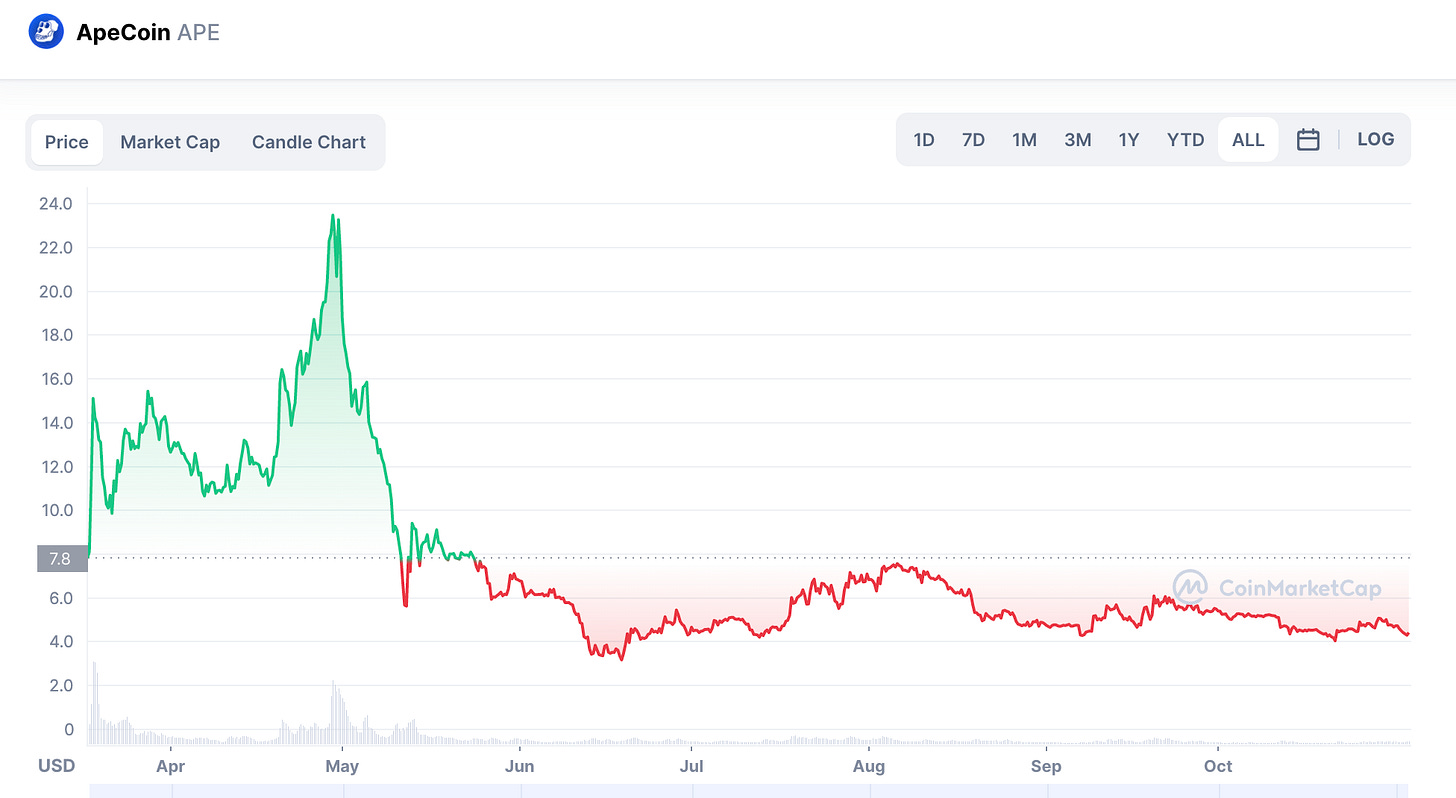Dear readers,
In the previous issue, we defined what is a security. Here, we look at an example of how this kind of thinking is applied to NFTs.
Are NFTs securities?
In the pursuit of its attempt to classify crypto as securities, the SEC has recently opened another can of worms, this time involving NFTs.
In a recent report by Coindesk, the SEC looked into Yuga Labs’ Bored Apes to determine whether these NFTs can be considered securities. There are two main items under scrutiny:
The Bored-Ape (BAYC) NFT itself
ApeCoin, a token issued by ApeDAO, a community not initiated by Yuga Labs.
If we refresh our memory as to what a security consists of, the key concern is whether people can expect a profit from others’ efforts.
The Culture of Flexing
When it comes to PFP NFTs, which is what Bored Apes and Cyberpunks are, there are essentially two kinds of people in my opinion. These are flexers and flippers.
Flexers are those who have the ability to proudly proclaim that they are :
members of an exclusive club
rich enough to buy their way into this club
Flippers depend on flexers to drive the price up for the NFTs. Can one say that flippers can expect a profit from the “efforts” of flexers? I think that’s where the grey area lies.
At this juncture, I’d like to interject my own opinion about flexing, one of the few topics I have strong feelings about. Word associations with flexing are competition, zero-sum game, bragging rights to name a few. These are mostly negative connotations for me. I’m not saying that no good can come out of it, but the bad ones far outweigh the good ones.
In the case of PFP NFTs, there is no good economical, productive reason for them to command some of the prices they do aside from flexing. Money spent purely for flexing is mostly unproductive.
Ok, getting off the soapbox now.
The SEC’s probe into the BAYC NFTs is its effort to determine whether these NFTs are similar to company shares. If yes, then they should have disclosure rules, just like the shares. As we saw above, the issuer, Yuga Labs, isn’t telling people that buying a BAYC NFT will definitely be a money-making venture, plus they themselves aren’t actively engaged in any activity that generates revenue for BAYC holders.
In addition, the ownership of an NFT does not extend to the ownership of Yuga Labs, unlike shares where holding enough of it lets you have a say in the company’s operations and future. Therefore, it’s a bit of a stretch to say NFTs and shares are similar. Still, other legal experts may be able to make a case for it. I’ll just let them wrangle over it. :)
ApeCoin Token
When it comes to ApeCoin, the possibility for it to be defined as a security is just as nebulous. The token itself was a way for those who couldn’t afford any of the Yuga Labs’ NFTs to still feel themselves to be part of the APE community. Are there any promises of profits here by the ApeCoin community? That’s highly doubtful.
The token price right now is $4.41 at the time of writing, a far cry from the $7.80 to $15 range. Certainly nowhere near its peak of $24.00 during the last bull run. These prices are mainly powered by pure speculation and nothing else. Not a strong case for it being a security?

Tokenised Items in NFT form
While the above refers mainly to art-based NFTs, would other kinds of NFTs with different models also be subject to this interpretation? I’m thinking of tokenisation, like a property NFT. The rise and fall of property prices would be less reliant on flexers but on buyers, whether for home ownership or investment. Flippers will still be part of this equation. The NFT, being a representation of the property, doesn’t carry any supply/demand on its own. Can it then be considered a security?
Why Does This Matter?
It matters for the same reasons as the ones for crypto. If something is recognised as a security, a whole bunch of paperwork appears for one. Platforms may, in order to not get into trouble, decide not to list the NFT/crypto for trading or even purchasing, hence limiting access to others. Basically, everyone needs to jump through some hoops. Not very democratic or inclusive. :(
Conclusion
The SEC can probe all they want, as long as the end result is that NFTs are determined not to be a security. :D However, there is one type of NFT that can potentially be a security, which are fractional NFTs. We’ll be looking into those in the next issue. :)
If you’d like to know more about this, please check out the following links:
https://decrypt.co/111682/apecoin-crashes-sec-probe-bored-ape-yuga-labs
https://www.dlapiper.com/en/us/insights/publications/2022/10/sec-investigating-nfts-and-yuga-labs/
As always, please feel free to share this with others who might have an interest in this topic.
Looking forward to your comments and ideas for future issues.



